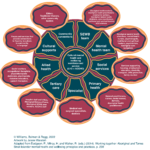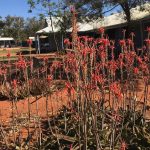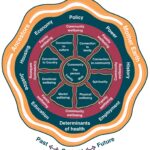
July 2023
Download Yanha-yalinya: Cultural responsiveness assessment tool for services and programs PDF
This is a tool to assess the cultural responsiveness of services and programs.
Cultural responsiveness has many meanings, but we consider it here to be the capacity of a service or program to respectfully use Aboriginal and Torres Strait Islander peoples’ knowledges, values and actions – ways of knowing, being, and doing – when designing, delivering and evaluating services and programs to be used by Aboriginal and Torres Strait Islander people.
We have developed a tool that organisations can use to assess their own cultural responsiveness, or that can be used by an outsider who is given access to policies, procedures and interviews. It focuses on services and programs, not the interactions of staff with clients or members of the public.
This tool is based on the holistic definition of Aboriginal and Torres Strait Islander health, on the health and human rights of Indigenous peoples, on cultural safety legislation and supporting documents, and on a range of literature and research about Aboriginal and Torres Strait Islander peoples and communities achieving wellbeing (see appendix).
The tool is also framed by multi-level empowerment theory, and a socio-ecological model of health and its determinants, which acknowledge that equity and wellbeing require actions at individual, family, community, service and system levels. This tool focuses on service and system levels, with actions at these levels providing individuals and their families and communities with best conditions for cultural safety and wellbeing.
In the health sector, Indigenous Allied Health Australia says in its cultural responsiveness framework (2015, p. 8) that:
It is the responsibility of health service providers to demonstrate culturally responsive leadership, and build governance structures and environments that ensure health professionals are encouraged, expected and able to respond to the needs of Aboriginal and Torres Strait Islander peoples effectively.
This tool divides cultural responsiveness concepts into themes, each with sub-themes:
- Self-determination
- Cultural safety
- Service development
- Health and wellbeing
The overall questions to be asked are: “What is the presence or absence of the sub-theme, to what extent, and what is the evidence?”
This tool does not check for service or program outcomes or impact, nor effectiveness, however, makes the assumption that establishing quality services and programs can lead to their effectiveness, and outcomes and impacts.
The tool is designed for people of any culture to use because it does not interpret information from a cultural perspective, but checks for extent and evidence of presence or absence.
The tool can be used simply as a checklist, or as a scorecard.
Scoring
Ask each question individually, and use a scale as follows:
- 0 – no evidence
- 1 – some evidence
- 2 – clear evidence.
The person doing the rating is tasked with matching the text in the research item/s to the themes and sub-themes in the lists.
If used as a scorecard, scores are applied to each theme and sub-theme, then summed.
The person doing the scoring needs discernment and to become conscious of bias. Keep critical self-reflection notes about rationale for scoring, thoughts, and points for discussion with colleagues.
Questions




Scores

We regard the percentages to equate as follows:
- 0-25% – not at all culturally responsive
- 26-50% – minimal cultural responsiveness
- 51-75% – moderate level of cultural responsiveness
- 76-100% – high level of cultural responsiveness.
Appendix: Development of the tool
This checklist was developed from a thematic analysis of key documents and resources about rights, principles and protocols of Aboriginal and Torres Strait Islander and other Indigenous peoples. These represent diverse perspectives, sustained engagement with ethical research practice and practical information to inform assessment of effectiveness.
Resources reviewed were:
- Australian Government Productivity Commission 2020 Indigenous Evaluation Strategy https://www.pc.gov.au/inquiries/completed/indigenous-evaluation/strategy/indigenous-evaluation-strategy.pdf
- Aboriginal Health and Medical Research Council of NSW 2020 Ethical guidelines: Key principles https://www.ahmrc.org.au/publication/ahmrc-guidelines-for-research-into-aboriginal-health-2020/
- Australian Health Practitioner Regulation Agency 2020 National Aboriginal and Torres Strait Islander health and cultural safety strategy 2020-25 https://www.ahpra.gov.au/About-Ahpra/Aboriginal-and-Torres-Strait-Islander-Health-Strategy/health-and-cultural-safety-strategy.aspx
- Australian Institute of Aboriginal and Torres Strait Islander Studies 2020 AIATSIS Code of ethics for Aboriginal and Torres Strait Islander research https://aiatsis.gov.au/research/ethical-research
- Haswell et al., 2012 program Critical Success Factors https://www.researchgate.net/publication/258022621_The_Social_and_Emotional_Wellbeing_of_Indigenous_Youth_Reviewing_and_Extending_the_Evidence_and_Examining_the_Implications_for_Policy_and_Practice
- Health Sociology Review 2022 Yuwinbir Special Issue articles on Indigenous knowledges https://www.tandfonline.com/doi/full/10.1080/14461242.2022.2091304
- Indigenous Allied Health Association 2015 Cultural responsiveness in action framework https://iaha.com.au/workforce-support/training-and-development/cultural-responsiveness-in-action-training/
- Jackson Pulver, Williams and Fitzpatrick 2019 model of multi-level empowerment in Oxford social determinants of health text
- Lowitja Institute 2022 Tools for culturally safe evaluationhttps://www.lowitja.org.au/page/services/tools/evaluation-toolkit
- Lowitja Institute 2022 Indigenous data sovereignty readiness assessment and evaluation toolkit 2022 https://www.lowitja.org.au/page/services/tools/indigenous-data-sovereignty-readiness-assessment-and-evaluation-toolkit
- Maiam nayri Wingara 2018 Indigenous data sovereignty principles
- National Aboriginal and Torres Strait Islander Health Plan, 2013-2023
- National Health and Medical Research Council (NHMRC) 2018 Ethical conduct in research with Aboriginal and Torres Strait Islander peoples and communities https://www.nhmrc.gov.au/about-us/resources/ethical-conduct-research-aboriginal-and-torres-strait-islander-peoples-and-communities
- NHMRC 2018 Keeping Research on Track II https://www.nhmrc.gov.au/about-us/resources/keeping-research-track-ii
- NHMRC 2018 National Statement on ethical conduct in human research (2007) updated 2018https://www.nhmrc.gov.au/about-us/publications/national-statement-ethical-conduct-human-research-2007-updated-2018
- One Twenty-One Seventy 2010-2016 Continuous Quality Improvement e-learning modules https://www.menzies.edu.au/page/Research/Centres_initiatives_and_projects/One21Seventy/
- United Nations Declaration on the Rights of Indigenous People 2007 https://www.un.org/esa/socdev/unpfii/documents/DRIPS_en.pdf
- Williams, M. (2018). Ngaa-bi-nya Aboriginal and Torres Strait Islander program evaluation frameworkhttps://journals.sagepub.com/doi/full/10.1177/1035719X18760141
Through a process of coding these documents with keywords arising from their core concepts, a long list of themes was identified. These signified expectations of research from Aboriginal and Torres Strait Islander peak bodies’ and researchers’ perspectives, remembering that all research with and by Aboriginal and Torres Strait Islander people is connected to Aboriginal and Torres Strait Islander communities.
Keywords were then condensed into a shorter list of themes representing minimum expectations about which all research on issues for Aboriginal and Torres Strait Islander children and families must be based and be reported to then consider effectiveness.
These themes were categorised further into the checklist’s core themes.
Recommended citation
Williams, M., & Ragg, M. (2023). Yanha-yalinya: Cultural responsiveness checking tool for services and programs. Yulang Indigenous Evaluation. https://yulang.com.au/starburst-indigenous- evaluations/yanha-yalinya/











